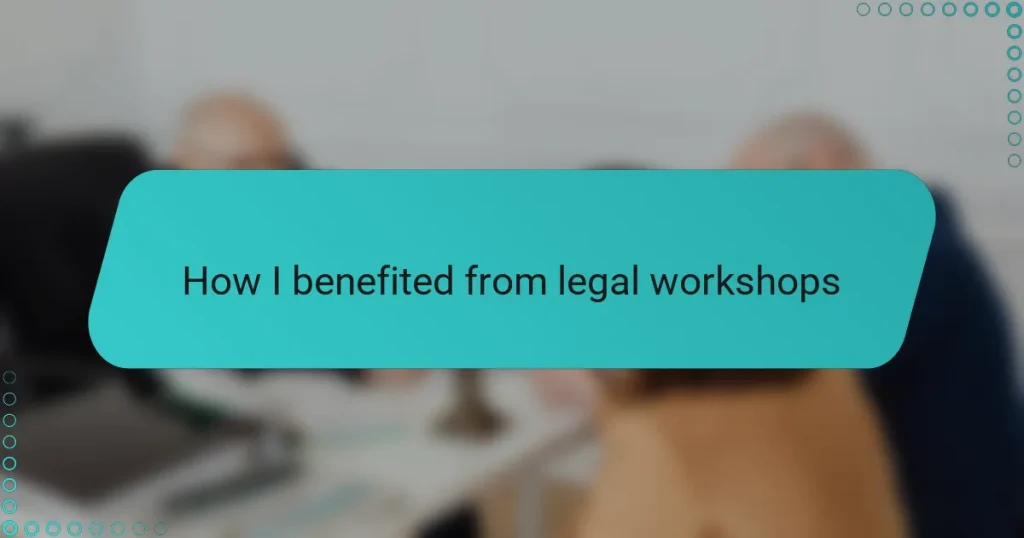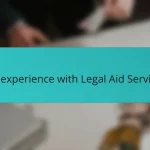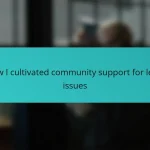Key takeaways
- Legal advocacy empowers individuals by making the law accessible and relatable, focusing on empathy and courage.
- Interactive legal workshops improve skills such as effective communication, critical thinking, and active listening, enhancing advocates’ ability to help others.
- Real-life application of workshop knowledge fosters confidence and trust-building in legal advocacy, transforming theoretical concepts into practical support.
- Overcoming challenges in advocacy is achieved through patience, adaptability, and celebrating small wins, reinforcing resilience in the pursuit of justice.
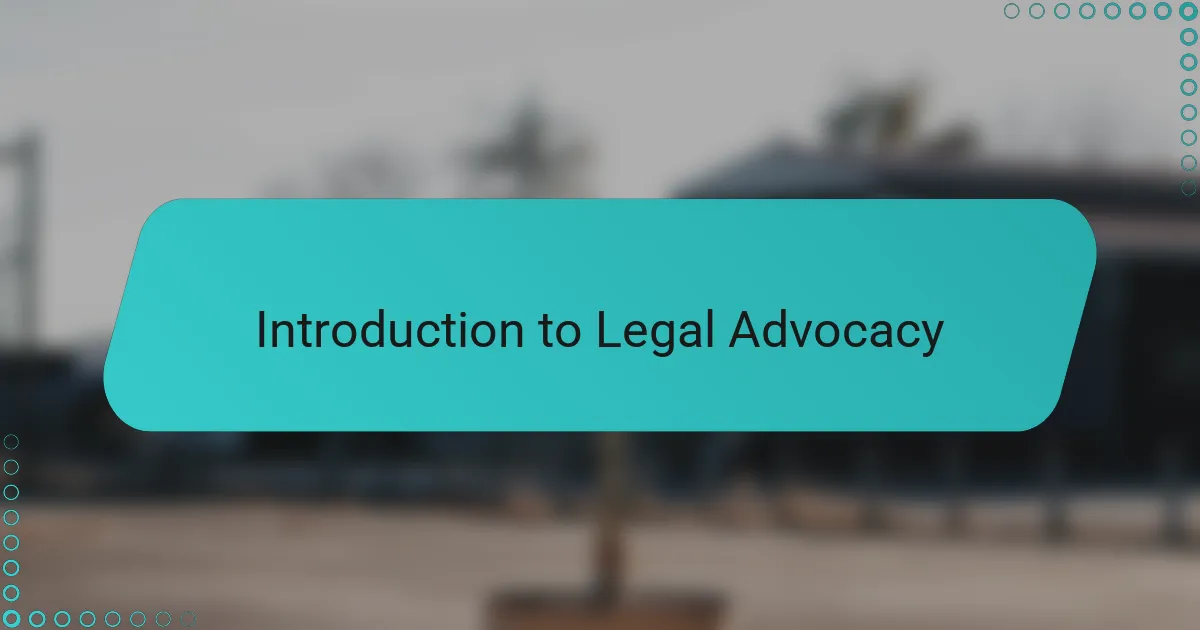
Introduction to Legal Advocacy
Legal advocacy, at its core, is about standing up for what is right and giving a voice to those who might otherwise go unheard. When I first encountered the concept, I wondered how a single person could make a meaningful difference within complex legal systems. Over time, I realized that advocacy is less about power and more about persistence and understanding.
What fascinates me most is how legal advocacy bridges the gap between laws on paper and their real-world impact. Have you ever felt overwhelmed by the legal jargon or the intimidation of courtrooms? Legal advocates break down these barriers, making justice accessible to everyday people like you and me.
From my experience, legal advocacy is a deeply personal journey. It’s not just about rules—it’s about empathy, courage, and the drive to protect rights. These qualities transformed the way I see justice, turning abstract policies into real stories of change.
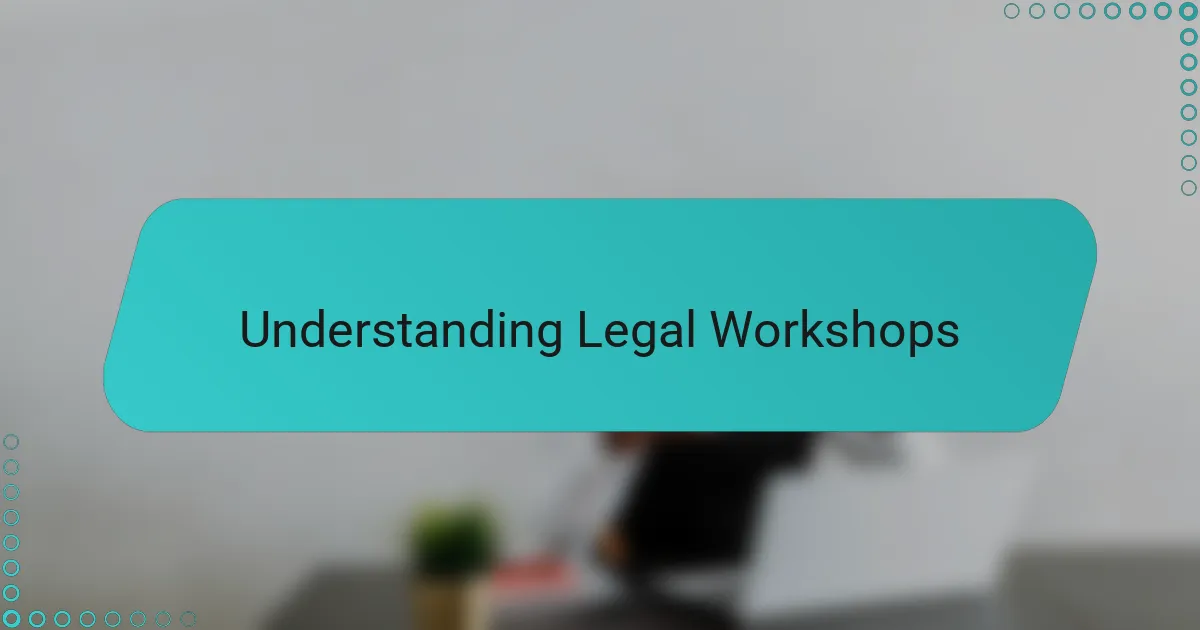
Understanding Legal Workshops
Legal workshops are more than just formal sessions filled with legal terms; they are surprisingly approachable spaces where complex laws become understandable. I remember feeling hesitant at first, thinking these workshops would be too technical. But they offered clear explanations and encouraged questions, which made the law feel less intimidating.
What struck me was how interactive these workshops are. Have you ever attended a session where you could actually share your experiences and hear from others facing similar legal challenges? That exchange made me realize I wasn’t alone and helped me connect what I learned to real-life situations.
These workshops also empowered me emotionally. Instead of feeling overwhelmed by the legal world, I began to see it as a tool I could use. That shift—from confusion to confidence—was a turning point in my journey as a legal advocate.
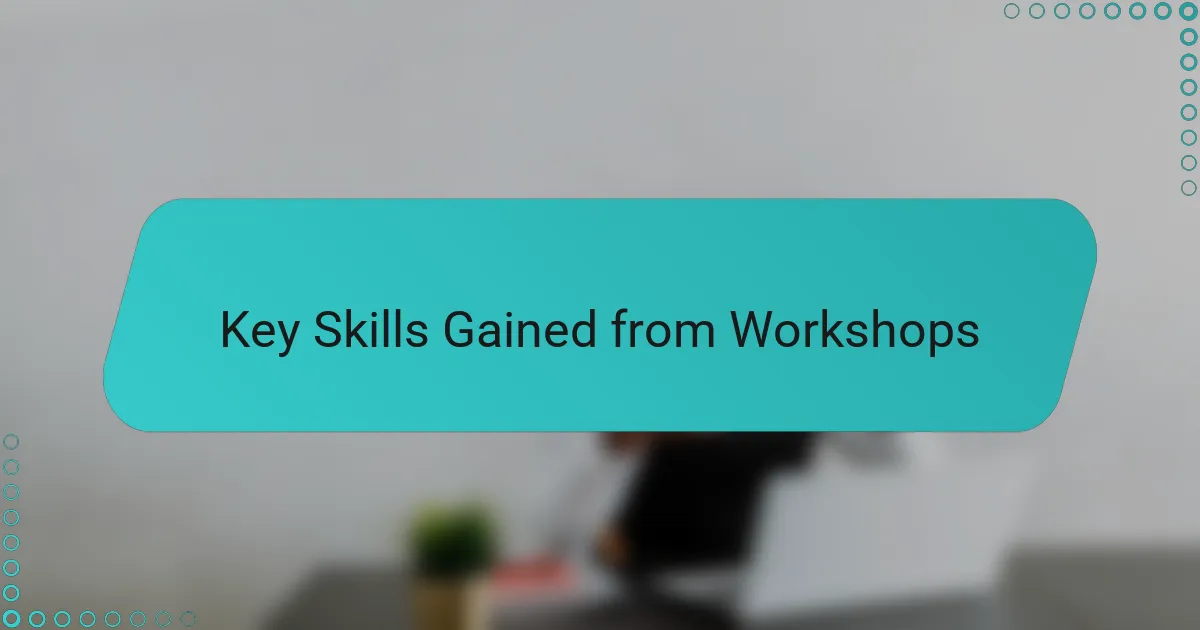
Key Skills Gained from Workshops
One of the most valuable skills I gained from these workshops was effective communication. Legal concepts can be dense, but learning how to break them down into clear, relatable terms made a huge difference. Have you ever struggled to explain something complicated and watched people’s eyes glaze over? I did too, until these workshops taught me techniques that truly engage listeners.
Another key skill I developed was critical thinking, especially when analyzing case studies or legal scenarios. The workshops challenged me to question assumptions and consider multiple viewpoints before reaching conclusions. This approach didn’t just improve my advocacy skills; it trained me to think more strategically in everyday situations.
Finally, I learned the importance of active listening. Early on, I focused too much on speaking and not enough on understanding others’ stories. These sessions emphasized listening deeply—not just to respond, but to truly grasp the underlying issues. That shift has made my advocacy more empathetic and effective, turning legal knowledge into real support for those in need.
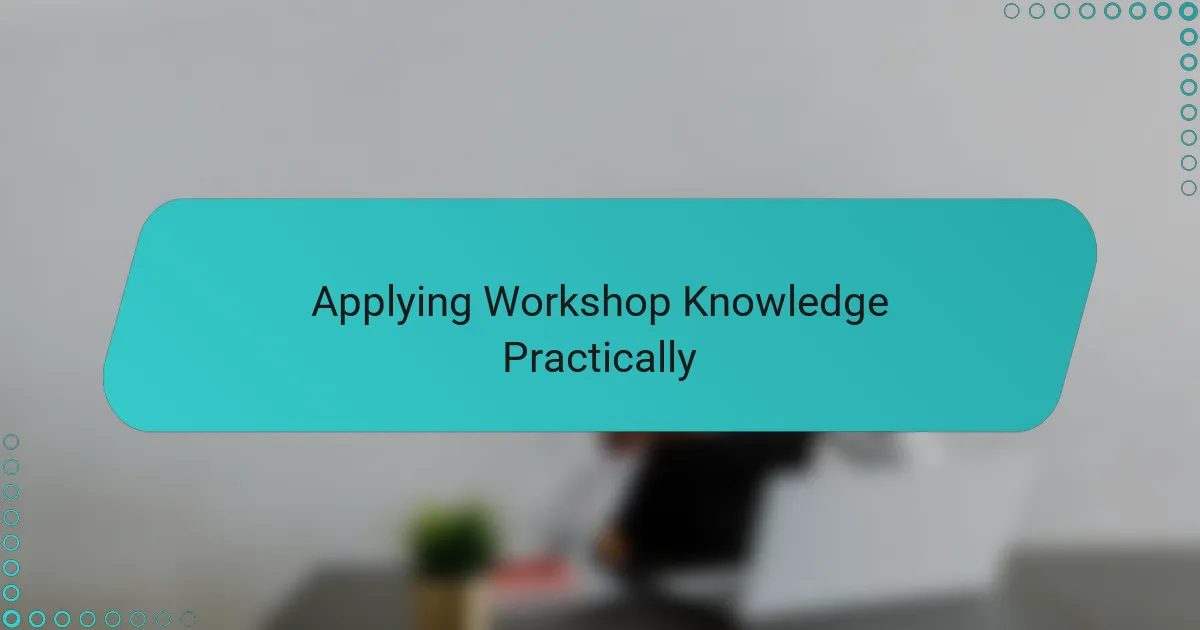
Applying Workshop Knowledge Practically
Putting what I learned in workshops into practice felt like stepping into a whole new world. I remember the first time I used my communication skills to explain a complicated legal right to a friend—it was empowering to see her eyes light up with understanding. Have you ever experienced that moment when someone finally “gets it”? That’s when all the workshop lessons clicked for me.
Applying knowledge practically also meant navigating real cases where emotions ran high. I found myself relying on active listening to truly connect with people’s stories, rather than just reciting rules. This shift made me realize that legal advocacy isn’t just about information—it’s about building trust and making the law human.
Sometimes, I had to think on my feet, using critical thinking skills from the workshops to adapt strategies as situations changed. It wasn’t always easy, but that challenge sharpened my ability to advocate effectively. Have you noticed how theory often feels distant until you’re face-to-face with the real thing? That’s where the true value of these workshops revealed itself for me.
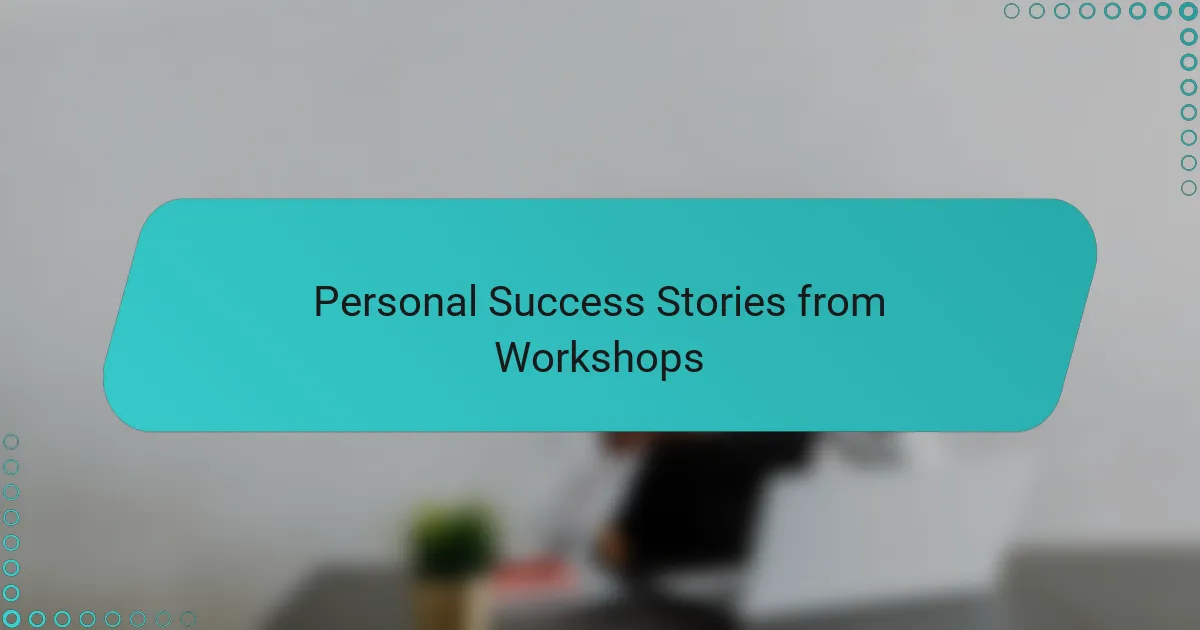
Personal Success Stories from Workshops
One of my most memorable moments came when I successfully helped a colleague understand her rights during a workplace dispute. Seeing her relieved and empowered made me realize how these workshops weren’t just about knowledge—they were about real impact. Have you ever had the chance to watch someone’s confidence grow because you shared something valuable? That feeling stayed with me long after the session ended.
Another story I often reflect on is when I volunteered at a community clinic after a workshop. I used the active listening and communication skills I’d gained to support a person facing eviction. It was intense and emotional, but I could see firsthand how the legal tools I’d learned translated into practical help. That experience shifted my perspective—I wasn’t just learning theory; I was becoming part of the solution.
Sometimes it’s the small wins that matter most. Like when I helped a friend draft a simple letter to assert her rights, something I wouldn’t have attempted before attending these workshops. It was a modest step, but it gave her a sense of control and hope. Isn’t it incredible how a few clear words, informed by legal knowledge, can change someone’s outlook entirely? Those moments made the workshops worth every minute for me.
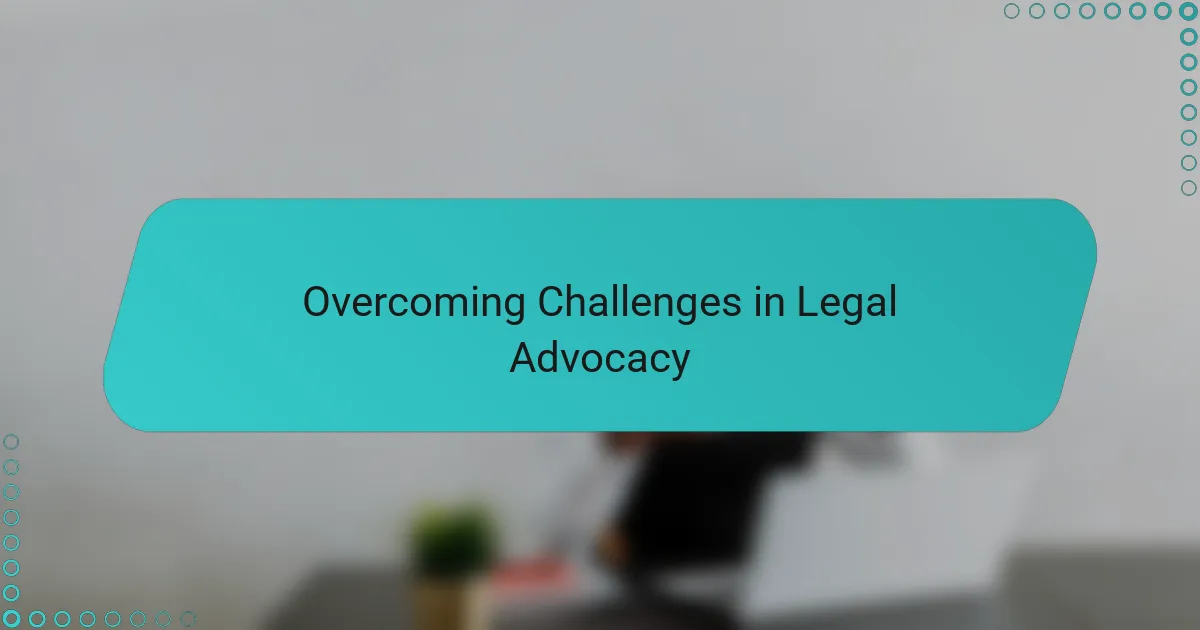
Overcoming Challenges in Legal Advocacy
Challenges in legal advocacy often feel like towering walls—complex laws, limited resources, and emotional hurdles can seem overwhelming at times. I remember feeling stuck when trying to support someone whose case was tangled in bureaucracy; it was those very moments that tested my patience and commitment. Have you ever faced a situation where the path to justice wasn’t clear, and the obstacles seemed insurmountable?
What helped me push through was a willingness to adapt and learn from each setback. Legal workshops taught me that challenges aren’t roadblocks but opportunities to sharpen skills and deepen empathy. When I applied active listening with a client frustrated by delays, just acknowledging their feelings opened doors that strict legal arguments couldn’t.
Sometimes, overcoming challenges meant accepting that advocacy is a marathon, not a sprint. I learned to celebrate small wins—a favorable phone call, a new connection, a clearer understanding—because they build momentum. Have you noticed how consistent effort, even in small doses, gradually breaks down those intimidating barriers? That perspective made all the difference in sustaining my advocacy journey.
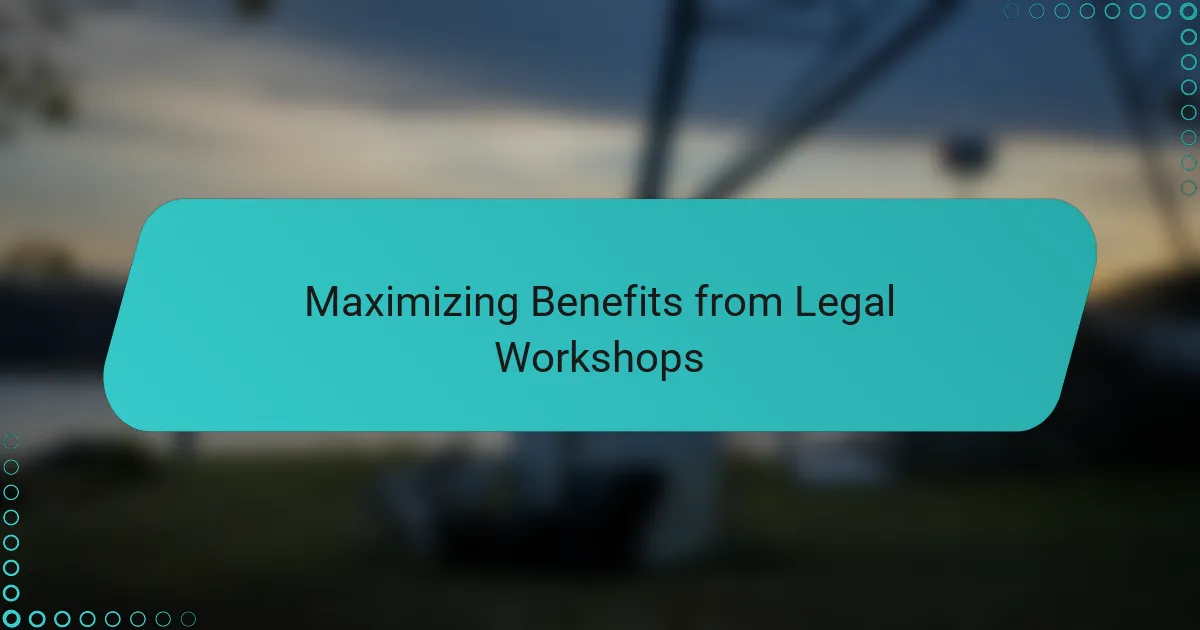
Maximizing Benefits from Legal Workshops
To truly maximize the benefits from legal workshops, I made it a point to engage actively rather than passively absorb information. Have you ever found yourself zoning out during a presentation only to forget key details later? By asking questions and sharing my own experiences, I found the sessions became far more meaningful and directly relevant.
Another strategy that worked for me was taking detailed notes and revisiting them regularly. Legal concepts can be complex, and without consistent review, it’s easy to lose track. I found that reflecting on workshop materials in the context of real cases helped cement my understanding and build confidence.
Finally, I think building connections with fellow participants enhanced my learning immensely. It wasn’t just about networking in the traditional sense; sharing challenges and solutions created a support system I could rely on beyond the workshop itself. Have you ever discovered that learning alongside others facing similar struggles makes the whole process less daunting? For me, those relationships turned knowledge into action.
